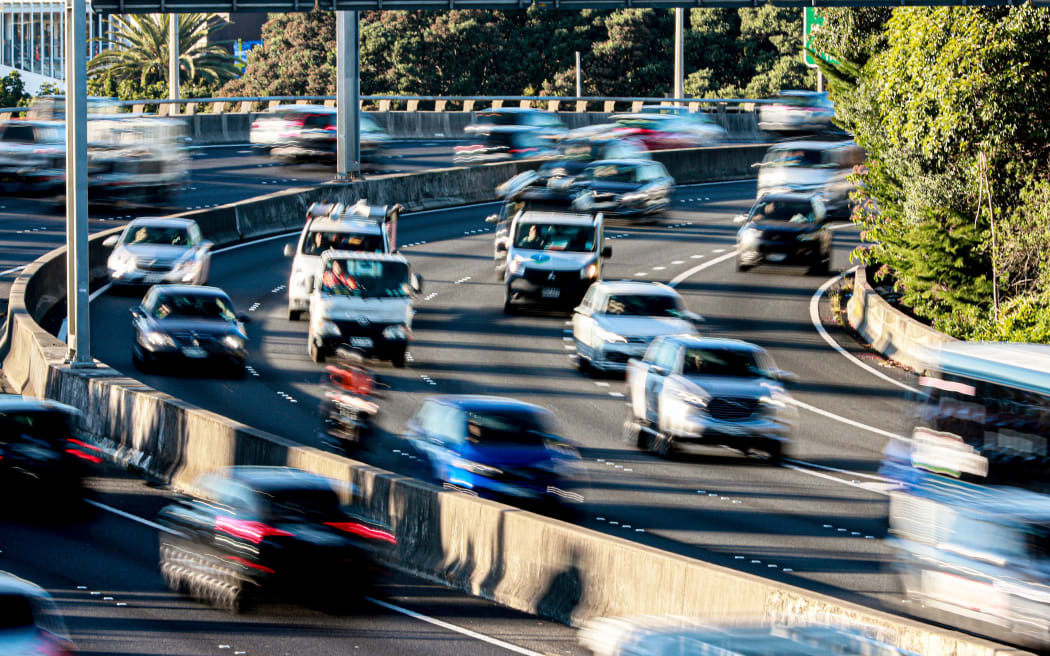Auckland Mayor Phil Goff says the newly released Transport Emissions Reduction Plan is "hugely ambitious" but it is achievable.

Photo: RNZ / Marika Khabazi
On Monday afternoon, Auckland Council released its proposed Transport Emissions Reduction Pathway, which sets out what is required to achieve a 64 percent reduction of the city's transport emissions by 2030.
If adopted, the document will be used to guide council planners during the development of future transport plans, helping to ensure they meet the objectives outlined in te Tāruke-ā-Tāwhiri: Auckland's Climate Plan - which gained unanimous support from councillors and Independent Māori Statutory Board members in 2020.
The plan released today lays out the road map to fewer gas guzzling cars including:
- Converting 30 percent of the city's vehicles to electric - especially commercial ones
- A ten-fold increase in so called active travel - walking and cycling
- Reducing traffic in neighbourhoods
- Aiming for a five-fold increase in the number of public transport trips taken
The transformation required in the plan will be funded through the reallocation of existing budgets along with additional funding from central and local government sources.
The Transport Emissions Reduction Pathway set out 11 areas for changes to the transport sector to reduce emissions:
- Using public transport much more
- Prioritising and resourcing sustainable transport
- Reducing travel where possible and appropriate
- Making neighbourhoods safer, with less traffic
- Putting things closer to where people live
- Electrifying private vehicles
- Encouraging walking and cycling
- Enabling new transport options
- Making buses, trains and ferries low-emissions
- Making freight and services cleaner and more efficient
- Enabling Aucklanders to make sustainable transport choices
Goff told Checkpoint the plan was "hugely ambitious, but I'm told that it is achievable".
However, the plan would only be achievable with the buy-in of Aucklanders, Goff said.
"The public at the moment is saying to us, you need to do more and you need to do it faster. The crunch point comes of course when we start to affect the way people live.
"You've got to be prepared to make changes in your lifestyle in order for this to happen. So this will be a combination of incentives to make alternative forms of transport more attractive, but it will involve some pressure the other way, and things like congestion charging, obviously, that's going to have an impact," Goff said.

Auckland Mayor Phil Goff. File photo. Photo:
Transport pollution accounted for more than 40 percent of the region's emissions, he said.
"In Auckland, the biggest single source of carbon pollution is our transport system, which accounts for more than 40 percent of our region's overall emissions.
"In a city where people once used to rely more on public transport, urban sprawl and motorway development from the 1960s has locked in car dependency and resulted in Aucklanders driving much more than in many comparable cities overseas. The Pathway shows how we can give transport choices back to Aucklanders."
About a half of all trips taken in the city were shorter than 6km, while a third of all trips were less than 2km, he said.
It would be important to discourage these short trips which could be walked or cycled, Goff said.
"That's where you want to start, isn't it? Because in the old days, particularly when we were at school, a journey like that you'd walk or cycle. Today, only three percent of kids are cycling to school."
Making alternative public transport options more attractive would be key to the success of the plan, Goff said.
However, enforcement measures such as congestion charging would likely play a role in achieving the targets.
The plan would offer council cross-benefits in tackling the issue of traffic congestion and air pollution, he said.
"You need to have public transport that is reliable convenient and affordable... as our city gets bigger so too does the problem of congestion so this plan deals not only with the problems of emissions but we need something to deal with congestion which is increasing year-on-year to the point that we'll reach gridlock."
Environment and Climate Change Committee chair councillor Richard Hills said it was important council and Auckland Transport supported Aucklanders in adapting their transport decisions.
"By putting the infrastructure and public transport systems in place across the entire region, we can reduce Auckland's long-standing over-reliance on cars by giving people more choice in how they travel," Hills said.
"The Transport Emissions Reduction Pathway is about unlocking our roads for those who need them, it is about how we can improve our air quality so we can all live healthier lives and it's about us spending more time with our families than stuck in traffic. Ultimately, it is about how we can, and will, create a more liveable Auckland."
Auckland Council chief sustainability officer Matthew Blaikie said achieving what was laid out in the Pathway would ensure the city was more resilient to external factors.
"If we achieve our transport emissions reduction goals, Aucklanders across the whole of the region will have more choice in how they get around, leaving us all less vulnerable to factors such as oil shocks that are outside of our control. It is one of the ways we can make ourselves more sustainable and resilient in the long term.
"We recognise that some of the required behaviour change simply isn't possible until our city is equipped to give Aucklanders more options for how they get around. The pathway gives us direction to put the necessary infrastructure and transport systems in place to help us achieve the level of change needed."
The council's Environmental and Climate Change Committee is set to decide on Thursday whether or not to adopt the plan.




